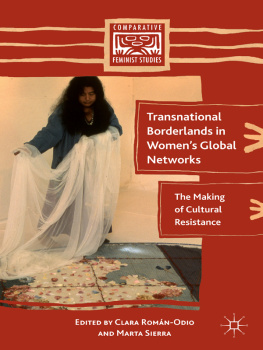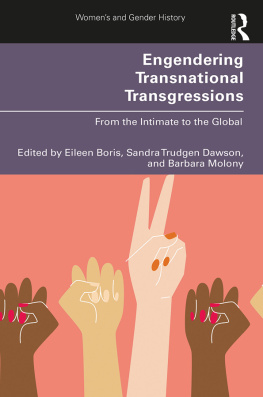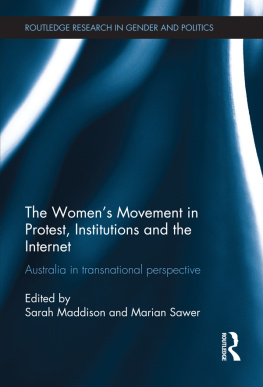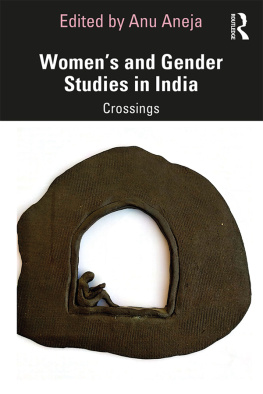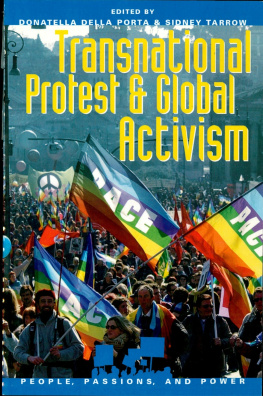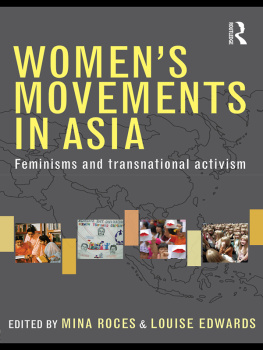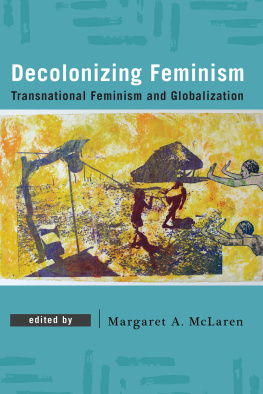COMPARATIVE FEMINIST STUDIES SERIES
Chandra Talpade Mohanty, Series Editor
PUBLISHED BY PALGRAVE MACMILLAN:
Sexuality, Obscenity, Community: Women, Muslims, and the Hindu Public in Colonial India
by Charu Gupta
Twenty-First-Century Feminist Classrooms: Pedagogies of Identity and Difference
edited by Amie A. Macdonald and Susan Snchez-Casal
Reading across Borders: Storytelling and Knowledges of Resistance
by Shari Stone-Mediatore
Made in India: Decolonizations, Queer Sexualities, Trans/national Projects
by Suparna Bhaskaran
Dialogue and Difference: Feminisms Challenge Globalization
edited by Marguerite Waller and Sylvia Marcos
Engendering Human Rights: Cultural and Socio-Economic Realities in Africa
edited by Obioma Nnaemeka and Joy Ezeilo
Womens Sexualities and Masculinities in a Globalizing Asia
edited by Saskia E. Wieringa, Evelyn Blackwood, and Abha Bhaiya
Gender, Race, and Nationalism in Contemporary Black Politics
by Nikol G. Alexander-Floyd
Gender, Identity, and Imperialism: Women Development Workers in Pakistan
by Nancy Cook
Transnational Feminism in Film and Media
edited by Katarzyna Marciniak, Anik Imre, and ine OHealy
Gendered Citizenships: Transnational Perspectives on Knowledge Production, Political Activism, and Culture
edited by Kia Lilly Caldwell, Kathleen Coll, Tracy Fisher, Renya K. Ramirez, and Lok Siu
Visions of Struggle in Womens Filmmaking in the Mediterranean
edited by Flavia Laviosa; Foreword by Laura Mulvey
Islam, Women, and Violence in Kashmir: Between India and Pakistan
by Nyla Ali Khan
Gender Epistemologies and Eurasian Borderlands
by Madina Tlostanova
Neoliberalization as Betrayal: State, Feminism, and a Womens Education Program in India
by Shubhra Sharma
Transnational Borderlands in Womens Global Networks: The Making of Cultural Resistance
edited by Clara Romn-Odio and Marta Sierra
Transnational Borderlands in Womens Global Networks
The Making of Cultural Resistance
Edited by
Clara Romn-Odio
and
Marta Sierra


TRANSNATIONAL BORDERLANDS IN WOMENS GLOBAL NETWORKS
Copyright Clara Romn-Odio and Marta Sierra, 2011.
All rights reserved.
First published in 2011 by
PALGRAVE MACMILLAN
in the United Statesa division of St. Martins Press LLC,
175 Fifth Avenue, New York, NY 10010.
Where this book is distributed in the UK, Europe and the rest of the world, this is by Palgrave Macmillan, a division of Macmillan Publishers Limited, registered in England, company number 785998, of Houndmills, Basingstoke, Hampshire RG21 6XS.
Palgrave Macmillan is the global academic imprint of the above companies and has companies and representatives throughout the world.
Palgrave and Macmillan are registered trademarks in the United States, the United Kingdom, Europe and other countries.
ISBN: 9780230109810
Library of Congress Cataloging-in-Publication Data
Transnational borderlands in womens global networks : the making of cultural resistance / Clara Romn-Odio, Marta Sierra, editors.
p. cm.(Comparative feminist studies)
Includes bibliographical references.
ISBN 9780230109810
1. WomenSocial networks. 2. Feminism. 3. Transnationalism. I. Romn-Odio, Clara, 1960 II. Sierra, Marta, 1968
HQ1885.T73 2011
303.48208209051dc22
2010043775
A catalogue record of the book is available from the British Library.
Design by Newgen Imaging Systems (P) Ltd., Chennai, India.
First edition: June 2011
10 9 8 7 6 5 4 3 2 1
Printed in the United States of America.
Figures
Series Editors Foreword
As I write, we have witnessed historic peoples revolutions in Tunisia, and Egypt, and are witnessing the rise of social movements against autocratic rulers and neoliberal economic policies in other parts of the Arab world, most notably Libya. And as many of us are glued to the media and hungry for news, we hear very little about womens roles in these movements, womens leadership in organizing the community resistance in Tahrir Square (Egypt), womens visions, dreams, and strategic organizing skills in these revolutions. And yet, we see images of women confronting armed police, organizing picket lines, reeling from being beaten by militias, and video taping and blogging at great risk to themselves. The last two months have profoundly changed the landscape of democratic and social justice struggles in the Arab world, and while women are perhaps less visible than we would like, gender politics remain at the center of these human rights struggles. Perhaps we need better lenses, better feminist analytics to see womens participation and leadership in these revolutions. The mobilization of transnational organizing and knowledge networks is readily acknowledged in the current anti-authoritarian social movements, and womens broad based participation in creating sustainable infrastructures is evident to some of us. But, many of us still ask where are the women? Transnational Borderlands in Womens Global Networks: The Making of Cultural Resistance provides some provisional answers to this question. As a whole the book provides innovative feminist theoretical and methodological lenses that allow us to see and analyze transnational forms of cultural resistance. Transnational Borderlands is thus a perfect fit for the CFS series.
The Comparative Feminist Studies (CFS) series is designed to foreground writing, organizing, and reflection on feminist trajectories across the historical and cultural borders of nation-states. It takes up fundamental analytic and political issues involved in the cross-cultural production of knowledge about women and feminism, examining the politics of scholarship and knowledge in relation to feminist organizing and social justice movements. Drawing on feminist thinking in a number of fields, the CFS series targets innovative, comparative feminist scholarship, pedagogical and curricular strategies, and community organizing and political education. It explores a comparative feminist praxis that addresses some of the most urgent questions facing progressive critical thinkers and activists today.
Over the decades, feminists across the globe have been variously successful at addressing fundamental issues of oppression and liberation. In our search for gender justice in the early twenty first century, however, we inherit a number of the challenges our mothers and grandmothers faced. But there are also new challenges to face as we attempt to make sense of a world indelibly marked by the failure of postcolonial (and advanced) capitalist and communist nation-states to provide for the social, economic, spiritual, and psychic needs of the majority of the worlds population. In the year 2011, globalization has come to represent the interests of corporations and the free market rather than self-determination and freedom from political, cultural, and economic domination for all the worlds peoples. The project of U.S. Empire building, the rise of Islamophobia in the United States and Europe, alongside the dominance of corporate capitalism and neoliberalism kills, disenfranchises, and impoverishes women everywhere. Militarization, environmental degradation, heterosexist State practices, religious fundamentalisms, sustained migrations of peoples across the borders of nations and geopolitical regions, environmental crises, and the exploitation of womens labor by capital all pose profound challenges for feminists at this time. Neoliberal economic policies and discourses of development and progress mark yet another form of colonial/imperial governance, masking the exercise of power over peoples lives through claims of empowerment. Recovering and remembering insurgent histories, and seeking new understandings of political subjectivities and citizenship have never been so important, at a time marked by social amnesia, global consumer culture, and the worldwide mobilization of fascist notions of national security.
Next page
